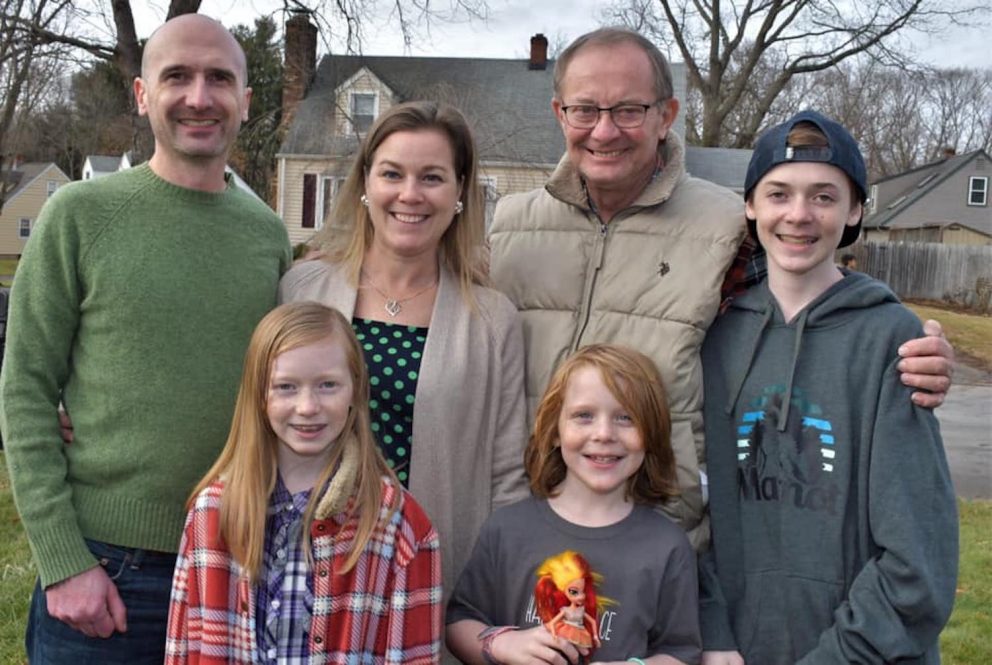After devoting her career to nonprofit work and fundraising, Abigail O’Brien’s breast cancer diagnosis at age 35 gave her a renewed sense of purpose. As a development officer at the UConn Foundation, she focused her attention on raising support for UConn Health and the Carole and Ray Neag Comprehensive Cancer Center, where she built professional relationships and friendships with her medical team and other physicians and researchers advancing cancer care.
“Abbie was inspired by her experience as a patient at UConn Health and knew definitively that this was what she wanted to do. This was her calling,” says Amy Chesmer, senior director of development for the College of Agriculture, Health and Natural Resources and O’Brien’s colleague at the time. “Being able to relate as a patient made her an incredible advocate.”

O’Brien—a mother of three—was keenly aware of the critical need for ongoing cancer research and the powerful role philanthropy plays. With profound gratitude for the care she received at UConn Health, O’Brien was inspired to make an impact on a personal level. Together with her husband, David, she established The Letts O’Brien Fund for Breast Cancer Research, which honors women diagnosed with breast cancer on both sides of their family, in 2013.
The fund blends support for two areas important to the family: research and patient care. It helps support the continuation of a clinical trial on the effects of chemotherapy on the cardiovascular system—a study O’Brien participated in as part of her care. For patients undergoing treatment, understanding of the potential cardiovascular side effects is vital for managing their ongoing health.
“Many highly effective cancer drugs can have cardiovascular side effects, and patients may face cardiotoxicity, which can lead to congestive heart failure,” explains Dr. Agnes Kim, associate professor of medicine, director of the Non-Invasive Cardiac Imaging and Echocardiography Lab, and director of the Cardio-Oncology Program at UConn Health.
Kim is leading the study, which looks at biomarkers and echo strain imaging as predictive tools for cardiotoxicity. The goal is to help doctors better identify individuals who are at a higher risk for having cardiotoxicity so that frequent monitoring and preventative treatments can be introduced early on.
The study will also help to raise awareness within the medical community, where Kim says there is a lack of knowledge of the close link between cancer and heart disease.
“Once a patient has a cancer diagnosis all the focus is on treating the cancer; one loses sight of the long-term cardiac effects,” Kim says. “Optimally managing underlying cardiovascular risk factors is important so that patients can successfully finish cancer treatment without having cardiac issues.”
Chesmer notes that funds like O’Brien’s are needed to support research and expanded clinical trials like this one.
“There is not as much federal funding for this type of research as there used to be, and large grants are few and far between,” she says. “Philanthropy serves a critical role here.”
Dr. Bruce Liang, interim chief executive officer of UConn Health and dean of the UConn School of Medicine, is a collaborator on the study and emphasizes how important this philanthropic support is for life-saving research and advancing patient care.
“Abbie’s dedication to UConn Health and the School of Medicine is deeply admired and appreciated,” he says. “We are always grateful to and inspired by Abbie.”
O’Brien has used her voice and writing talent to share her personal journey, connect with other women diagnosed with breast cancer, and raise awareness. Her blog garnered the attention of the Susan G. Komen Foundation, which featured her on a podcast and picked her up as a columnist. She is a source of inspiration for the people who know her, including her former UConn Foundation colleagues.
Jennifer Franklin is one of the many UConn Foundation employees who regularly contribute to O’Brien’s fund through payroll deduction. A breast cancer survivor, Franklin says that O’Brien’s support and friendship helped her navigate her own diagnosis and treatment.
“Abbie is a strong person and a go-getter. She was the first person I reached out to when I was diagnosed, and she talked me through the first steps and what I needed to do,” she says. “I have a family history of breast cancer. Supporting causes related to breast cancer has been close to my heart since I lost my aunt in 1996. The research taking place thanks to Abbie’s fund is so important, and I wanted to do whatever I could to support it.”
“We often talk about philanthropy being a personal journey of passion. For Abbie, and for Jennifer too, this is as personal as it gets,” Chesmer says. “They are supporting research to preserve their own lives and the lives of their daughters, sisters, nieces, and friends.”
Chesmer adds that philanthropic efforts like The Letts O’Brien Fund for Breast Cancer Research play an important role in the promise of new therapies and drug discoveries.
“Breakthroughs are possible for breast health,” Chesmer says. “If there is anything positive to take away from the pandemic, I hope it is that investing funding and resources in academic medical centers puts groundbreaking advances within reach. That should inspire us all.”



